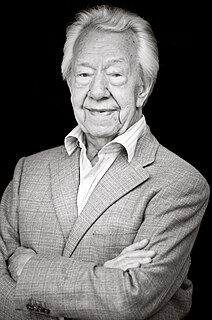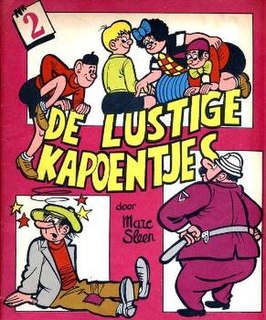Legacy
Ons Volkske published mostly Belgian and Dutch comics artists, the most notable being Marc Sleen ( Piet Fluwijn en Bolleke ), Willy Vandersteen (De Vrolijke Bengels), Bob de Moor, Piet van Elk, Henk Albers, Albert van Beek, Gommaar Timmermans, Hurey, Gilbert Declercq, Gert Ronde, Karel Verschuere, Jacques Van Melkebeke, Jo-El Azara, Tibet, and reprints of series that were published in Tintin before. [4] Due to its low price and cheaper print paper "Ons Volkske" gained the nickname "the poor man's version of Tintin", but despite that it was still the trend-setting comic book magazine in Flanders and sold very well during its heyday.

Marcel Honoree Nestor, Knight Neels, known as Marc Sleen, was a Belgian cartoonist. He was mostly known for his comic The Adventures of Nero and Co., but also created gag comics like Piet Fluwijn en Bolleke, De Lustige Kapoentjes, Doris Dobbel, Oktaaf Keunink and De Ronde van Frankrijk.
Notable events of 1938 in comics. See also List of years in comics.
Notable events of 1937 in comics. See also List of years in comics.

Jozef "Jef" Nys was a Belgian comic book creator. He was best known for his comic strip Jommeke.
Dutch comics are comics made in the Netherlands. In Dutch the most common designation for the whole art form is "strip", whereas the word "comic" is used for the (usually) soft cover American style comic book format and its derivatives, typically containing translated US superhero material. This use in colloquial Dutch of the adopted English word for that format can cause confusion in English language texts.
Notable events of 1945 in comics. See also List of years in comics.
This is a timeline of significant events in comics in the 1910s.
Galerie Lambiek is a Dutch comic book store and art gallery in Amsterdam, founded on November 8, 1968 by Kees Kousemaker, though since 2007, his son Boris Kousemaker is the current owner. From 1968 to 2015, it was located in the Kerkstraat, but in November 2015, the store moved to the Koningsstraat 27. As of 2018, Lambiek is the oldest comics store in Europe, and the oldest worldwide still in existence.
Notable events of 1947 in comics. See also List of years in comics.

E. O. Plauen was the pseudonym of Erich Ohser, a German cartoonist best known for his strip Vater und Sohn.

Dick Matena is a Dutch comics writer and cartoonist. He has also published under the pseudonyms A. den Dooier, John Kelly and Dick Richards. He has made several kinds of comics, from humor comics to erotic comics, but is best known for his comic book adaptations of famous literary novels.

Father and Son are cartoon figures created by E. O. Plauen. The pantomime comic depicts a plump, balding father and his son grappling with various everyday situations. The cartoon was a weekly feature in the Berliner Illustrirte Zeitung from 1934 to 1937.

Piet Fluwijn en Bolleke was a Belgian gag-a-day comic strip series drawn by Marc Sleen from 1944 until 1965. It was continued by artists Hurey and Jean-Pol until 1974.
't Kapoentje was a youth supplement published by the Flemish newspaper Het Volk from April 3, 1947 until 1989. It was notable for its comics and, together with Ons Volkske, the most important comic book magazine in Flanders.

De Lustige Kapoentjes was a long-running Flemish comic book series, which existed under different titles and was drawn by different artists, among whom Marc Sleen and Willy Vandersteen are the most well known. The series was published in 't Kapoentje, the youth supplement of Het Volk, and in Ons Volkske, the youth supplement of De Standaard. They were the mascots of 't Kapoentje from 1947 until the magazine's demise in 1985.

Eric de Noorman was a Dutch comic strip, published in text comic format, and drawn by Hans G. Kresse from 1946 until 1964. The stories featured a Viking king, Eric, and his adventures overseas. Together with Kapitein Rob and Tom Poes, Eric de Noorman is widely considered to belong to the Big Three in Dutch comics history. Kresse's well documented stories and high quality drawing are praised and have influenced many other European comics artists. Eric de Noorman is one of the few Dutch comics to gain popularity in foreign translations. In the Netherlands, it was published in Het Vaderland, De Nieuwe Haarlemsche Courant and Tom Poes Weekblad, in Flanders in Het Laatste Nieuws and De Nieuwe Gazet, in Wallonia in Le Soir. The comic has been translated into French, Danish, Finnish, German, Spanish, Swedish, Portuguese and English. From 1948 on the stories were published in oblong format books at the low price of 75 cent.
Bert is a Belgian comic strip, written and drawn by Kamagurka, which appeared exclusively in the Flemish magazine HUMO since 1977. The cartoons have also been published in the Dutch magazine Vrij Nederland, the French magazine Charlie Hebdo and the US magazine RAW. The series' protagonist, Bert, is Kamagurka's most recognizable character.
Het Manneke was a Flemish TV sketch show broadcast on the BRT between 1961 and 1963.
Notable events of 1932 in comics. See also List of years in comics.







